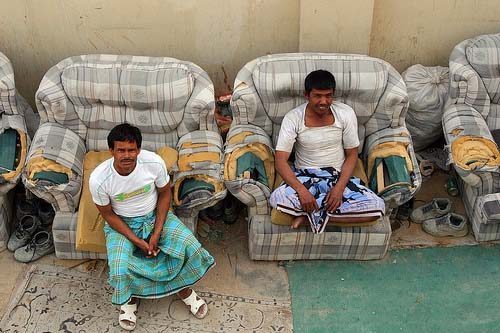
In its latest report, Human Rights Watch has once again blasted Qatar for its treatment of low-income migrant workers, whose numbers are expected to increase by an estimated million people in the run-up to the 2022 World Cup.
The international advocacy group told Doha News that it will hold a press conference here next week to push for improved conditions for the country’s labor class, who account for more than half of Qatar’s nearly 2 million residents.
Last summer, HRW released a landmark report investigating the plight of migrant workers, outlining squalid living conditions, exploitation and other violations.
Its latest release, the 665-page 2013 World Report, touches on human rights issues in more than 90 countries, and also condemns November’s life sentencing of a Qatari poet charged with inciting the overthrow of the regime. His appeals judgment will be heard next month.
In an internationally broadcast press briefing held this afternoon, HRW’s deputy director for Middle East/North Africa said:
#Qatar: promotes expression abroad but imprisons poet at home says @nadimhoury #WR2013
Migrant rights
Though Qatar’s labor law limits working hours, requires paid annual leave and outlines requisite health and safety conditions for work environments, enforcement of it is weak and does not cover female domestic workers, the report states.
Additionally, it pointed out that expats are unable to legally unionize or strike, despite comprising 99 percent of the private sector workforce. The sponsorship, or kafala system, also makes it difficult to workers to change jobs or leave the country, even on vacation, without their employers’ permission.
Also in the report, HRW asserted that euphoria over the Arab Spring has passed, criticizing what it called Islamist-dominant governments, including Egypt, for oppressing women and stifling free speech.
Meanwhile, the Guardian reports that the Qatar 2022 Supreme Committee has nearly completed a “migrant worker charter” for all World Cup-related projects. Under the charter, labor requirements will be clearly outlined in tender documents and the country will work with HRW and others to seek “the highest health and safety and worker welfare standards to the benefit of all major projects in Qatar.”
Here’s the Qatar chapter of the report.
Thoughts?
Credit: Photo by Richard Messenger







